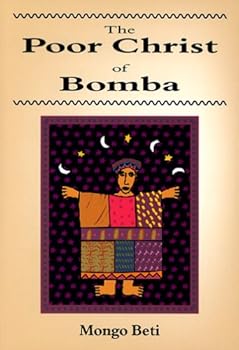The Poor Christ of Bomba
Select Format
Select Condition 
Book Overview
In Bomba girls are being prepared for Christian marriage. Gradually it becomes apparent that the local churchmen have been using the girls for their own purposes. This description may be from another edition of this product.
Format:Hardcover
Language:English
ISBN:1577664183
ISBN13:9781577664185
Release Date:July 2005
Publisher:Waveland Press
Length:219 Pages
Weight:0.58 lbs.
Dimensions:1.3" x 8.5" x 11.0"
Customer Reviews
3 ratings
Great
Published by Thriftbooks.com User , 16 years ago
The book gives a really great look into colonialism and missionaries in Cameroon in the first half of the 20th century. Looking into Beti's past, it's obvious he has a strong bias against Christian missionaries--specifically Catholics. Nevertheless, the book is really great and has much deeper meaning even on a religious level, as there are strong parallels to the Bible.
Missionary zeal and superficial Christianity
Published by Thriftbooks.com User , 21 years ago
In this Book Mongo Beti castigates a system that must have first initiated him to the written word. The satire here is very subtle but hardly loses its potency. At first glance, The Reverend Father Superior comes across as the true believer that he is: a real man of God. He is well respected by the local people and even loved. But as is typical of the European expatriate community, he does not bother to find out what the people think. He comes as a benevolent spirit who is equiped with the message of Christ to save the "pagans", but somehow, only the women (most from polygamous households) and the children are interested in his salvation. The men, the real holders of power in the community are not ready to submit to his new doctrine. He believes this is because it requires them to give up their multiple wives and practice monogamy as his doctrine requires. He holds this assumption for twenty years until the time comes when his mission falls apart. This begins when the young women engaged to be married to some villagers, and who he has been charged to make into Christian wives, have instead become his indentured servants helping to build his mission. His other local employees, sensing that what is good for the goose is good for the gander, also take advantage of this opportunity to obtain sexual favors from this women. The good man of God, after twenty years of false belief finally gets the truth from his African cook. The local men believe, so the cook says, that the reverend father is hiding the truth from them. They do not want to hear about God, eternal life, and matters of the spirit. They knew these things long before the whiteman came. All they want to know is the whiteman's secret: his airplanes, and other issues of his technology which the reverend father does not want to divulge. This realization somehow hastens the good man's departure from Africa. He is a dissapointed man. This paradox of good intensions and failed hopes has characterized African/European encounters since. The European priest has come with readymade ideas of what he thinks Africans need. It turns out Africans do not want what he is offering. The Africans do no want to be led to the whiteman's religion. They want his airplanes, and his technology. They want his secret but not his doctrine. Mongo Beti portrays the reverend father as a good father who is pained by his wayward children. He exposes the failures of the missionary system without ridiculing it, no doubt keeping in mind from whom he himself got his first taste of the written word.
A straightforward enjoyable yet educational novel.
Published by Thriftbooks.com User , 22 years ago
The Poor Christ of Bomba was an assigned reading in my college seminar class dealing with French colonialism in Africa last semester. I enjoyed it immensely-it was enjoyable yet educational. The narrator speaks with a refreshing and poignant naive honesty. Whether you are interested in colonialism in Africa or a good read, please pick this novel up!





